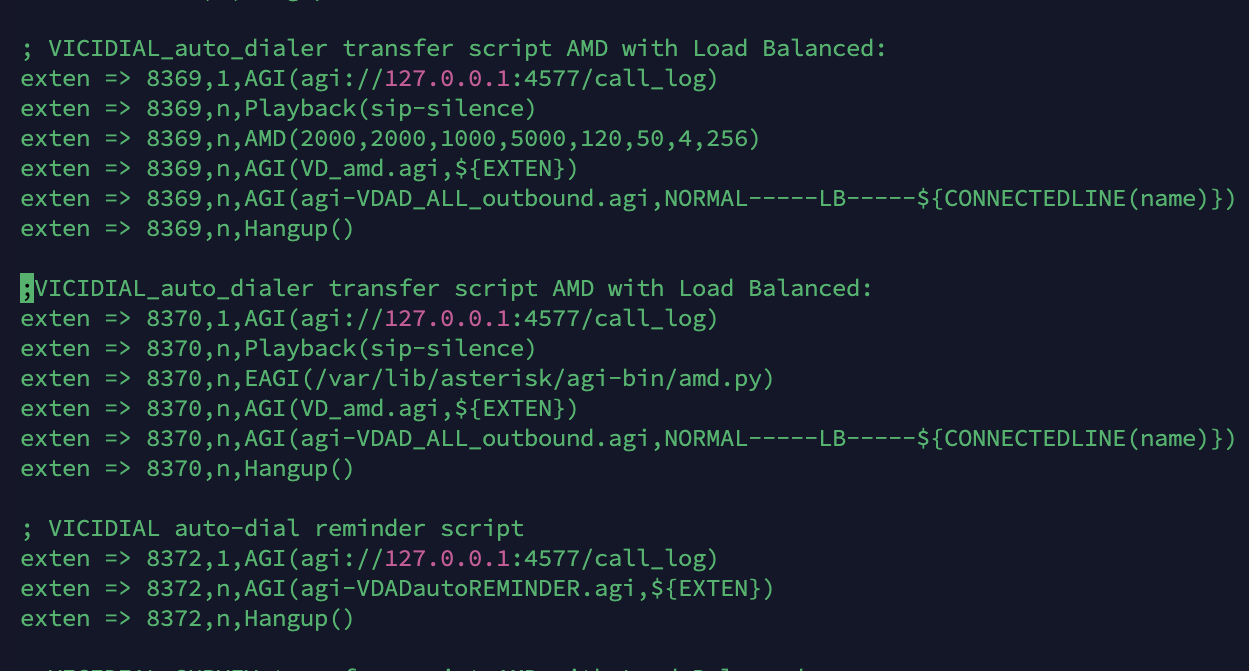Outbound call centers need efficiency, precision, and scale. By integrating AMDY.ai’s AI-powered Answering Machine Detection (AMD) with Vicidial, your agents can focus on real conversations while the system automatically handles voicemails. This integration ensures smarter call handling, higher productivity, and cost savings.
Why Integrate AMDY.ai with Vicidial?
- Real-time AI detection of humans vs. voicemail.
- Improved agent utilization by skipping unanswered or machine-answered calls.
- Seamless compatibility with Vicidial, Asterisk, and FreeSWITCH.
- Flexible configuration to adapt to your existing campaigns.
Integrating with Dialers
Below are the steps to integrate AMDY.ai with Vicidial / Asterisk (EAGI).
1. Update the Dialplan
Edit your extensions.conf file to add the AMD transfer script:


; VICIDIAL_auto_dialer transfer script AMD (load-balanced)
exten => 8370,1,AGI(agi://127.0.0.1:4577/call_log)
exten => 8370,n,Playback(sip-silence)
exten => 8370,n,EAGI(/var/lib/asterisk/agi-bin/amd.py)
exten => 8370,n,AGI(VD_amd.agi,${EXTEN})
exten => 8370,n,AGI(agi-VDAD_ALL_outbound.agi,NORMAL-----LB-----${CONNECTEDLINE(name)})
exten => 8370,n,Hangup()2. Install Dependencies
Run the following on your dialer server:
apt-get install -y python3-pip
pip3 install websocket-client asterisk-agi
install -m 0755 amd.py /var/lib/asterisk/agi-bin/amd.py
chown asterisk:asterisk /var/lib/asterisk/agi-bin/amd.py3. Configure the amd.py Script
The amd.py script handles audio streaming from the dialer to the AMD server, parses responses, and sets decision variables.
#!/usr/bin/env python3
#/var/lib/asterisk/agi-bin/amd.py
import os, fcntl, json, time
from websocket import create_connection
from asterisk.agi import AGI
AUDIO_FD = 3
WS_URL = os.getenv("AMD_WS_URL", "ws://amdy.ai:8080/ws/amd")
SAMPLE_RATE = int(os.getenv("AMD_SAMPLE_RATE", "8000")) # EAGI audio usually 8kHz
EARLY_MIN_CONF = float(os.getenv("AMD_EARLY_MIN_CONF", "0.90"))
def set_human(agi, cause="HUMAN", stats=None):
agi.set_variable("AMDSTATUS", "HUMAN")
agi.set_variable("AMDCAUSE", cause)
if stats: agi.set_variable("AMDSTATS", stats)
def set_machine(agi, cause="MACHINE", stats=None):
agi.set_variable("AMDSTATUS", "AMD")
agi.set_variable("AMDCAUSE", cause)
if stats: agi.set_variable("AMDSTATS", stats)
def should_stop_on(msg):
if not isinstance(msg, dict): return None
typ = str(msg.get("type", "")).lower()
label = str(msg.get("label", "")).lower()
conf = float(msg.get("confidence", 0.0) or 0.0)
if typ == "final":
return label
if typ == "early" and conf >= EARLY_MIN_CONF:
return label
return None
def process_json_and_set_vars(agi, msg):
label = str(msg.get("label", "")).upper() # HUMAN/MACHINE
conf = msg.get("confidence", "")
ph = msg.get("proba_human", "")
tr = msg.get("transcript", "")
typ = msg.get("type", "")
cause = f"{typ}|p_human={ph}|conf={conf}"
stats = f"{label}|{cause}|{tr[:120]}"
(set_human if label == "HUMAN" else set_machine if label == "MACHINE" else set_human)(
agi, cause if label in ("HUMAN","MACHINE") else "UNKNOWN", stats
)
def startAGI():
agi = AGI()
try:
ws = create_connection(WS_URL, timeout=5)
ws.send(json.dumps({"config": {"sample_rate": SAMPLE_RATE}}))
agi.verbose(f"AMD: WS connected {WS_URL} (sr={SAMPLE_RATE})")
except Exception as e:
agi.verbose(f"AMD: WS connect error {e} → default HUMAN")
set_human(agi, cause="NETERR"); return
fcntl.fcntl(AUDIO_FD, fcntl.F_SETFL, os.O_NONBLOCK)
last_msg = None
total_bytes = 0
buf = b""
start = time.time()
try:
while True:
try:
time.sleep(0.2)
chunk = os.read(AUDIO_FD, 9500)
if not chunk:
ws.send(json.dumps({"type":"flush"}))
for _ in range(5):
try:
res = ws.recv()
msg = json.loads(res) if isinstance(res, str) else {}
last_msg = msg or last_msg
stop = should_stop_on(msg)
if stop:
process_json_and_set_vars(agi, msg); return
except Exception:
break
if last_msg: process_json_and_set_vars(agi, last_msg)
else: set_human(agi, cause="NOAUDIO")
return
buf += chunk
if len(buf) >= 6400: # ~0.4s at 8kHz
ws.send_binary(buf)
total_bytes += len(buf)
buf = b""
try:
ws.settimeout(0.01)
res = ws.recv()
msg = json.loads(res) if isinstance(res, str) else {}
last_msg = msg or last_msg
stop = should_stop_on(msg)
if stop:
process_json_and_set_vars(agi, msg); return
except Exception:
pass
finally:
ws.settimeout(5)
if (time.time() - start) > 5 and total_bytes == 0:
ws.send(json.dumps({"type":"flush"}))
try:
res = ws.recv()
msg = json.loads(res) if isinstance(res, str) else {}
process_json_and_set_vars(agi, msg)
except Exception:
set_human(agi, cause="TIMEOUT")
return
except OSError as err:
if getattr(err, "errno", None) == 11:
continue
set_human(agi, cause="AUDIOERR"); return
except Exception as e:
set_human(agi, cause="NETERR")
finally:
try: ws.send(json.dumps({"type":"flush"}))
except Exception: pass
try: ws.close()
except Exception: pass
if __name__ == "__main__":
startAGI()Key environment variables:
- AMD_WS_URL → WebSocket endpoint (default:
ws://amdy.ai:8080/ws/amd) - AMD_SAMPLE_RATE → Usually
8000Hz (set16000if required) - AMD_EARLY_MIN_CONF → Confidence threshold for early decisions (default
0.90)
The script sets three variables in the dialer:
AMDSTATUS→HUMANorMACHINEAMDCAUSE→ Detailed cause string (e.g.,final|p_human=0.02|conf=0.98)AMDSTATS→ Compact log including transcript snippet
4. Call Flow Handling
Once AMDY.ai detects a voicemail, VD_amd.agi decides the next action:
- Drop a voicemail.
- Hang up.
- Transfer only human calls to an available agent.
5. Audio Configuration Notes
- If your media path is 16 kHz, set:
export AMD_SAMPLE_RATE=16000 - If your AMD server expects 16 kHz but the dialer streams 8 kHz, enable server-side upsampling (preferred). Otherwise, configure resampling on the EAGI side.
Benefits for Call Centers
✅ Save time – Voicemail calls are filtered automatically.
✅ Increase efficiency – Agents only handle live customers.
✅ Boost ROI – More productive conversations, fewer wasted minutes.
✅ Flexible deployment – Works seamlessly across Vicidial, Asterisk, and FreeSWITCH.
Final Thoughts
Integrating AMDY.ai with Vicidial unlocks the true potential of outbound campaigns. With intelligent answering machine detection, you can maximize agent productivity, reduce wasted resources, and ensure every connected call adds value.
Ready to power up your Vicidial campaigns? Get started with AMDY.ai.

